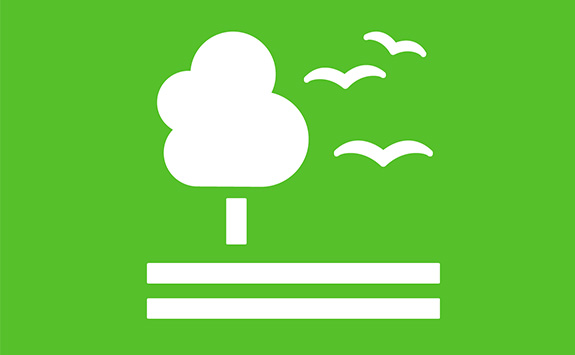Life on Land
Protect and promote sustainable use of terrestrial ecosystems and reverse land degradation.
UN Sustainable Development Goals
17 Sustainable Development Goals are at the core of the United Nations' 2030 Agenda for Sustainable Development. They represent a blueprint for peace and prosperity that all its member states adopted in 2015.
Find out more about how Newcastle University is working towards these goals to help create a better and fairer world.
Goal 15
We are proud to have a very green campus in a large urban area. Our Grounds Team collaborates with colleagues and students in the University community. This helps to increase biodiversity by providing food, shelter and habitats for wildlife to flourish.
Our researchers contributed to the development of the STAR metric. This metric allows us to understand extinction risk in a much more detailed way.
We are committed to conserving and increasing biodiversity on our campus and further afield.

Our campus
Newcastle University’s city centre campus supports a variety of wildlife with its green spaces. We're committed to preserving and enhancing biodiversity.
Our campus has achieved a Silver Hedgehog Friendly Campus award. We support pollinators by planting pollinator-friendly flowers across the estate. We have installed bat boxes and barns at one of our student accommodation sites to give roosting areas to the urban bat population.
STAR metric
The STAR metric provides an overall measure of species at risk of extinction in a particular place. The metric development was led by:
- Newcastle University
- the International Union for the Conservation of Nature (IUCN)
The metric allows us to assess which places have the highest overall extinction risk and what threats are contributing to this.
Managing and enhancing biodiversity on our farms:
Newcastle University (NU) Farms is a research, teaching and commercial farming operation. It encompasses 800ha of Red Tractor assured mixed arable and grazing operations. It also has a dairy herd of 250 cows.
The farming operations run across three sites in Northumberland, in North East England:
- Nafferton
- Cockle Park
- Ouston
We are a Linking Environment and Farming (LEAF) Demonstration and Innovation Farm. LEAF Farms are working farms that commit to delivering and promoting sustainable farming practices.
We have formal programmes in place to conserve and enhance the biodiversity on these farms.
Our Countryside Stewardship Agreement and our Sustainable Farming Incentive Pilot Scheme both administered by the Rural Payments agency on behalf of Defra, UK Government are notable examples of this. The two agreements encompass the whole of farmed area of approximately 760 ha.
We undertake management to maintain and enhance biodiversity. Key elements of our agreement are to:
- Enhance bird populations. This is through a range of actions designed to increase invertebrate food supply, including for chicks of ground nesting species, increase food supply through habitat management and provision of supplementary food over the winter, and to provide nesting habitat for Lapwing (Vanellus vanellus), a UK Red Listed species
- Use fallow land, beetle banks, flower rich margins and other management practices to provide important sites, for invertebrates, including bumblebees and other pollinators and to enhance diversity of wild flowers and other plants
enhance hedgerows, woodland edges and other structural habitat features - Protect and enhance water quality, through managing riparian strips, providing new habitat designed to reduce surface run off and so improve water quality, and provide alternative water sources for livestock
Outreach
NU Farms has an extensive outreach programme. This covers all aspects of management, such as:
- Agricultural production
- Sustainable farm management
- Land management
- Sustainable management of land for agriculture
It largely focusses on Nafferton and Cockle Park Farms, but also includes activities on the main university campus and participation in regional and national events.
Events are all free. They include:
- Presentations
- Project partners discussions (CHAP Lupin Project)
- Public lectures
- Farm walks (One Newcastle, student visits etc.)
- Open days
- Training events
- College student activities
- Delivery of outreach activities at regional and national farming workshops, exhibitions and shows (e.g. Cover Crop Guide Consortium, Farm Research Forum, North East Dog Festival, Northumberland County Show, Agroforestry Open Weekend etc.)
Target audiences are similarly varied, ranging from primary school children through college and university students to the public, and farming and land management professionals.
